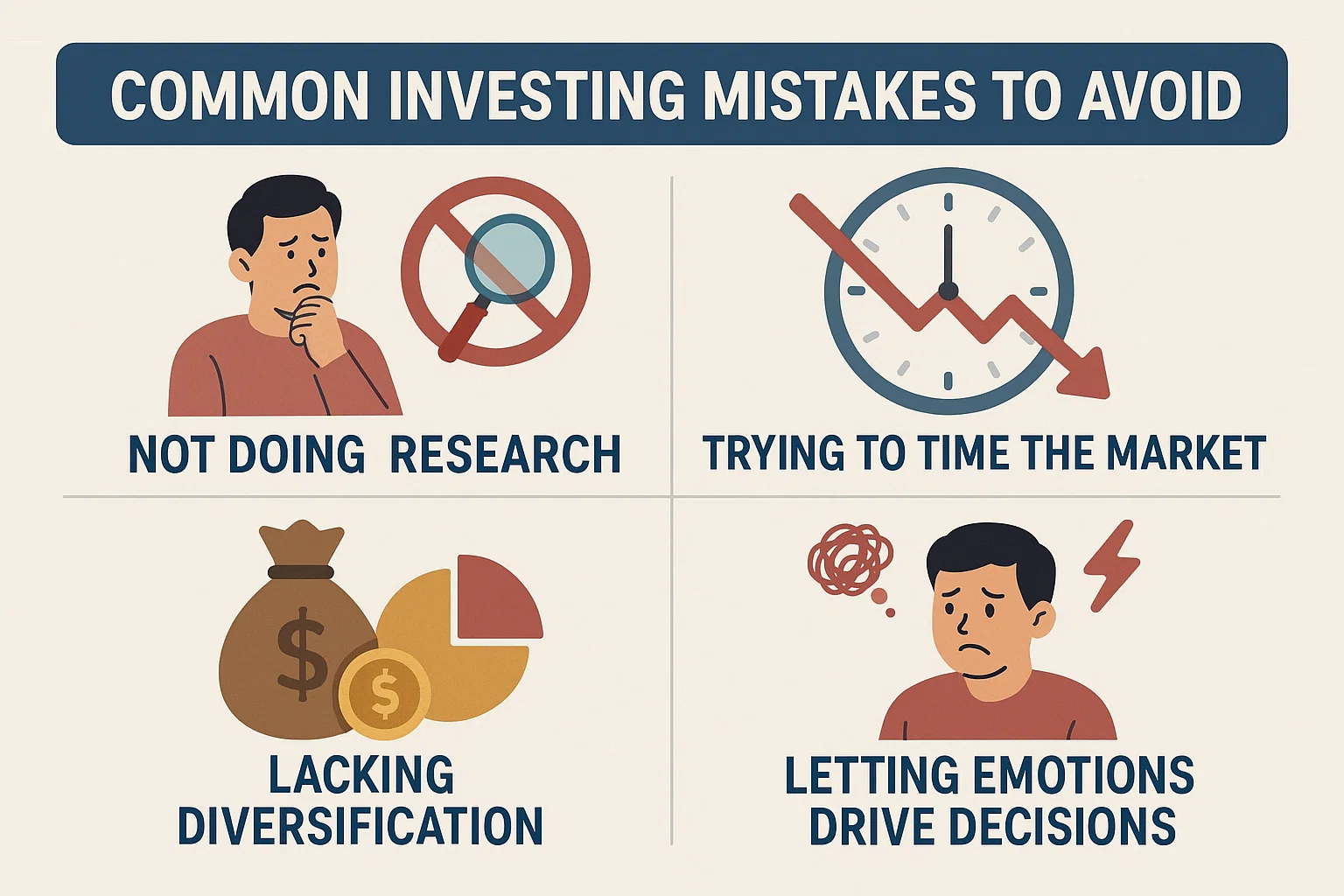💡 Introduction
Common investing mistakes to avoid can quietly erode your returns and set you back years in your wealth-building journey. Whether you’re new to the markets or a seasoned investor, these nine pitfalls can trip you up if you’re not vigilant.
Let’s explore each mistake and learn how to sidestep them for smarter, more confident investing in 2025.
💥 9 Common Investing Mistakes to Avoid
1. ❌ Chasing Past Performance
Investors often buy funds or stocks solely because they performed well last year. Past returns are no guarantee of future gains. Instead, focus on fundamentals, expense ratios, and long-term potential.
2. 📈 Lack of Diversification
Putting all your capital into one sector or a handful of stocks increases risk dramatically. Diversify across asset classes—large-cap, mid-cap, bonds, gold, and international funds—to cushion volatility.
3. ⏰ Trying to Time the Market
No one can consistently predict market highs or lows. Attempting market timing leads to missed rallies or buying at peaks. Adopt a systematic approach like SIPs (Systematic Investment Plans) to average out market swings.
4. 💳 Ignoring Costs and Fees
High expense ratios, transaction fees, and exit loads can erode gains. Always compare expense ratios of mutual funds and use discount brokers to minimize trading costs.
5. 🛑 Reacting to Market Noise
News headlines and social media can spark fear or greed. Emotional decisions—selling in a crash or buying in a hype—often lock in losses. Stick to your long-term plan and avoid knee-jerk moves.
6. 🔢 Not Rebalancing Your Portfolio
Over time, winners can dominate your allocation. Failing to rebalance means your risk profile drifts. Review and realign your holdings every 6–12 months to maintain your target asset mix.
7. 🎯 Setting Unrealistic Expectations
Expecting 20% annual returns from a balanced portfolio is setting yourself up for disappointment. Understand historic average returns—8–12% from equity funds—and plan accordingly.
8. 📋 Skipping Due Diligence
Blindly following tips from friends or influencers without research is risky. Always read fund documents, check company financials, and understand the business before investing.
9. 🚫 Neglecting Tax Implications
Ignoring capital gains tax, securities transaction tax, or dividend distribution tax can reduce net returns. Plan your investments—use tax-efficient instruments like ELSS or hold equity funds for over a year to qualify for long-term capital gains benefits.
🔗 Useful Links – bit2050.com
🌐 Resources
❓ FAQ – Common Investing Mistakes to Avoid
Q1. How can I avoid emotional investing?
Set clear rules (e.g., no trading on news), automate investments via SIPs, and review performance quarterly instead of daily.
Q2. What’s a good rebalancing frequency?
Once or twice a year—ideally every 6–12 months—to realign with your original risk profile.
Q3. How many stocks should a beginner hold?
Aim for 10–15 stocks across sectors, or start with diversified mutual funds/ETFs to simplify exposure.
Q4. Can high fees really hurt returns that much?
Yes. A 1% higher expense ratio on a ₹10 lakh portfolio can cost you over ₹5 lakh in lost gains over 20 years.
Q5. Should I consult a financial advisor to avoid mistakes?
A certified financial planner can offer personalized guidance, especially for complex goals—but you can also learn and implement these best practices on your own.
🏁 Final Thoughts
By understanding these common investing mistakes to avoid, you can build a more resilient, growth-oriented portfolio. Stay disciplined, informed, and patient—and watch your wealth compound over time.
👉 Discover more investing insights at bit2050.com and take control of your financial future today!




